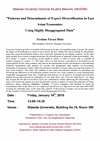WUDSN (Waseda University Doctoral Student Network) January 2011 Events
2011.01.13
Friday, January 14th, 2011
"Patterns and Determinants of Export Diversification in East Asian Economies:
Using Highly Disaggregated Data"
Long run economic growth is associated with learning to produce an expanding range of goods. The greater the degree of diversification in export of an economy, the less volatile will export earnings be. Researchers argue that export diversification matters and is especially important for developing countries. On the other hand, product level extensive margin determines the diversification of bilaterally traded good bundles: Why does country 'i' export a very diverse goods bundle to country 'j' while it exports only in a handful of product categories to country 'k'? This study will try to find out how concentrated or diversified are the export patterns in East Asian countries, and what are the determinants for the concentration or diversification. Empirical international trade analyses for accurate and disaggregate trade statistics are increasingly demanding. Contemporary studies suffer from limited commodity coverage while analyzing trade patterns of East Asian countries. This study will contribute to the export diversification literature by presenting and discussing the differences in diversification patterns between East Asian countries by using internationally comparable disaggregated trade data. Traditional trade theories are ill suited to investigate diversification patterns because they provide no explanation of zero trade flows. The "new-new trade theory", by taking into account the fact that not all firms export, has contributed to efforts addressing this shortcoming. This study will examine the pattern of export specialization and the evolution of export diversification in China, Indonesia, Japan, Malaysia, Philippines, Republic of Korea, Singapore and Thailand by using the concentration index at the SITC (rev 3) 3 digit level and HS (rev 2) 6 digit level over the years 2001-2009, covering all commodity data. At the same time, analysis of the presence of many zeros in the trade matrix for the countries of interest will be done by using disaggregated level data.
- Presenter: Ferdous Farazi Binti
- PhD Student, GSAPS, Waseda University
Date: Friday, January 14th, 2011
Time: 13:00-14:30
Venue: Waseda University, Building No.19, Room 309
Presentation in English (No Interpreter)
Admission Free / No Pre-Registration Required
Organized by: Waseda University Doctoral Student Network (WUDSN)
Supported by: Global Institute for Asian Regional Integration (GIARI)

 Poster [82KB]
Poster [82KB]